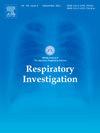A systematic review of factors associated with poor prognosis despite appropriate antibiotics usage for pneumonia
IF 2.4
Q2 RESPIRATORY SYSTEM
引用次数: 0
Abstract
Treatment with appropriate antibiotics does not seem to be associated with prognosis among elderly patients with pneumonia. Identifying factors associated with poor prognosis despite the use of appropriate antibiotics might help withhold aggressive antibiotic treatment in patients with pneumonia. This systematic review aims to identify the risk factors associated with unfavored outcomes despite using appropriate antibiotics for pneumonia. The PubMed database was searched for studies focusing on appropriate antibiotic use in patients with pneumonia (assessed on Aug 7, 2024). Appropriate antibiotics were defined as those sensitive to microorganisms isolated from patients. The risk of bias was evaluated using the Risk of Bias Assessment tool for nonrandomized Studies utilized for controlled observational studies.
A total of 1563 studies were identified from the database, and eight observational studies were included in this review: ventilator-associated pneumonia (n = 4), community-onset pneumonia (n = 2), P. aeruginosa pneumonia (n = 1), and S. maltophilia pneumonia (n = 1). Advanced age was the most commonly evaluated factor associated with mortality. Additionally, high severity scores were related to the unfavored outcomes even after treatment with appropriate antibiotics. Advanced age and high severity scores may be associated with increased mortality despite appropriate antibiotic usage for pneumonia. Broad-spectrum antibiotics might not be indicated in elderly pneumonia patients with high severity status who do not wish to receive aggressive antibiotic treatments.
系统回顾肺炎抗生素使用得当但预后不良的相关因素
使用适当的抗生素治疗似乎与老年肺炎患者的预后无关。找出与使用适当抗生素但预后不良相关的因素,可能有助于暂停对肺炎患者进行积极的抗生素治疗。本系统综述旨在确定肺炎患者在使用适当抗生素治疗后仍出现不良预后的相关风险因素。我们在 PubMed 数据库中搜索了有关肺炎患者适当使用抗生素的研究(评估日期为 2024 年 8 月 7 日)。适当的抗生素被定义为对从患者体内分离出的微生物敏感的抗生素。数据库中共识别出 1563 项研究,本综述共纳入 8 项观察性研究:呼吸机相关肺炎(4 项)、社区发病性肺炎(2 项)、铜绿假单胞菌肺炎(1 项)和嗜麦芽糖酶肺炎(1 项)。高龄是最常见的与死亡率相关的评估因素。此外,即使在使用适当的抗生素治疗后,严重程度评分高也与不利的结果有关。尽管肺炎患者使用了适当的抗生素,但高龄和严重程度评分高可能与死亡率增加有关。对于不希望接受积极抗生素治疗、病情严重程度高的老年肺炎患者来说,广谱抗生素可能并不适用。
本文章由计算机程序翻译,如有差异,请以英文原文为准。
求助全文
约1分钟内获得全文
求助全文

 求助内容:
求助内容: 应助结果提醒方式:
应助结果提醒方式:


